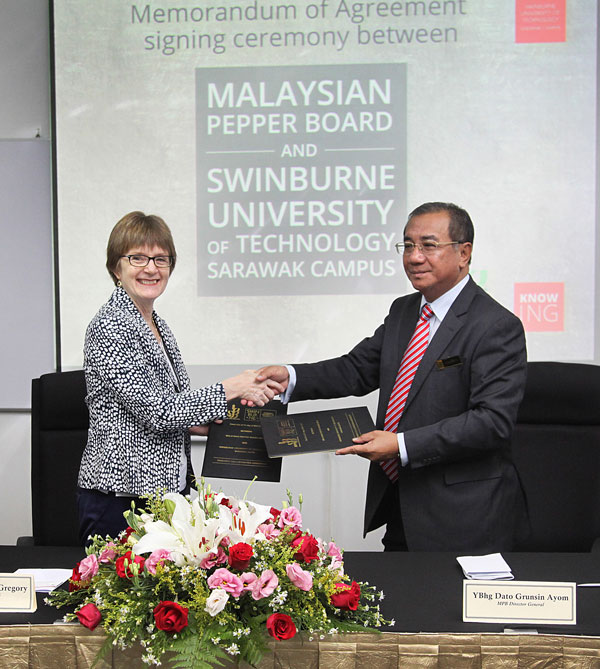KUCHING – Pepper farmers in the country could soon reap the benefits of a collaboration between the Malaysian Pepper Board (MPB) and Swinburne University of Technology Sarawak Campus.
The government agency and the Australian university recently signed a memorandum of agreement (MoA) to look into increasing pepper production, and combating a host of pests and diseases that affects the pepper plant.
Malaysia is one of the largest pepper producers in the world, with Sarawak accounting for 95 per cent of the production in the country.
In 2014 black pepper accounted for 28,300 tons with an export value of RM 514 million, while white pepper prices are at a premium and remains consistent.
According to the State Farmers’ Association Sarawak, pepper is one of the cash crops supporting the livelihood of about 67,000 rural dwellers in upland areas of the State.
While demand increases at seven per cent annually, production has a growth of only 0.7 per cent each year. The potential for growth is huge, and the government wants the Malaysian Pepper Board to increase output by 30 per cent
“But stepping up production is not that simple,” said MPB Director-General Dato Grunsin Ayom.
“There are numerous issues surrounding the growth of the humble pepper, the two biggest being fighting pest diseases and finding the best possible variety to grow.”
“These issues are best solved through biotechnology, and Swinburne is well placed to assist us in this. It will also result in the use of fewer pesticides which is much better for our ecology,” he said.
In hailing the MoA, Swinburne Sarawak Deputy Vice-Chancellor and CEO Professor Janet Gregory said that the collaboration will help students to remain up-to-date with industry practices and in the application of their knowledge.
“Our theoretical research can be applied and new knowledge is turned into know-how.
“Researchers working on this project will have access to both Swinburne’s and the Pepper Board’s facilities and the cost of this research will be shared, and will result in a positive research impact.”
Following the MoA, two research officers from the MPB will pursue PhD degrees with Swinburne Sarawak.
They will be supervised by Dr Hwang Siaw San from the university and will look into increasing the pepper plant’s resistance to diseases.
In addition, they will look into influencing even ripening of the fruit to increase yield. Uneven ripening of pepper berries requires a higher input of labour for selective harvesting, and contributes to low productivity and affects the quality of the pepper products.
Hwang is an active biotechnology researcher and is currently studying the antioxidant properties of rice bran with the Sarawak General Hospital Heart Centre, Swinburne University in Melbourne and Okayama University in Japan.


